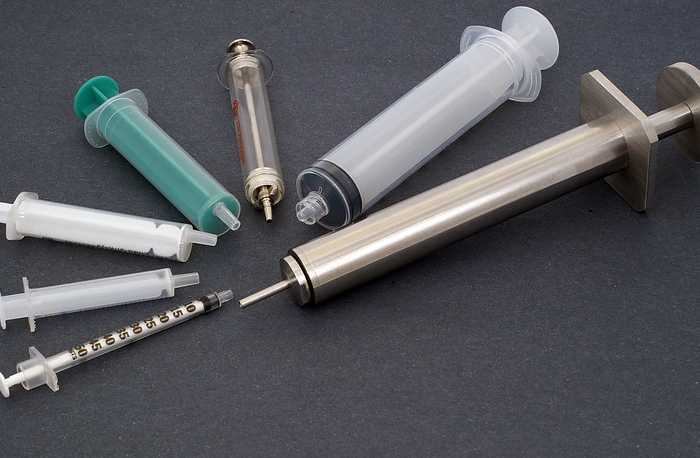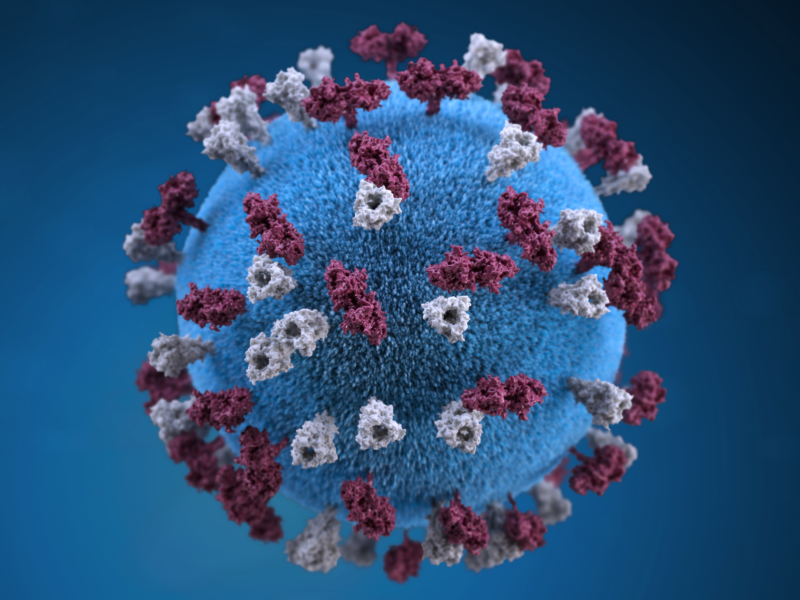Image courtesy of Flickr, Creative Commons
Amid the chaos, grief, and sadness during the COVID-19 (Coronavirus Disease) pandemic, there is hope for a possible vaccine against severe acute respiratory syndrome 2 (SARS-CoV-2), the causative virus of COVID-19, to control the spread of disease transmission and future outbreaks. While there is limited progress for developing a treatment to COVID-19, momentum to develop an effective vaccine to prevent infection is steadily growing in the United States.
Vaccine Development Process
The process for developing a vaccine is lengthy and typically takes many years from start to finish [1]. There are six stages that comprise vaccine development in the U.S.: 1) exploratory stage, 2) pre-clinical stage, 3) clinical development, 4) regulatory review and approval, 5) manufacturing, and 6) quality control [2]. During the exploratory stage, scientists research the disease itself to identify antigens, and methods for developing immunity to the disease [1]. Scientists also evaluate the quality and efficacy of the vaccine to ensure safety on a cellular level [1]. In the pre-clinical stage of development, the vaccine is applied to animal models to ensure safety and efficacy [1]. Prior to testing the vaccine on humans, the U.S. Food and Drug Administration (FDA), must approve the vaccine through an Investigational New Drug application to ensure minimal risk when used in clinical trials [3]. Clinical trials include three phases, each time expanding the number of subjects included in the trial [1]. Phase I allows developers to understand effective dosage and administration methods to create an immune response; Phase II allows developers to continue to understand the safety and efficacy in humans in a population that may be exposed to the disease; and Phase III trials look at long-term safety in a large population [1-2]. Phase I typically takes one year to complete, and Phase II and III each typically take one and a half years to complete [4]. The FDA’s Center for Biologics Evaluation and Research External (CBER) is then in charge of licensing a vaccine as part of the regulatory review and approval stage through the Biologics License Application [2]. The FDA is responsible for the potency, safety, and purity of a vaccine, as well as inspecting the manufacturing of the vaccine [1-2]. Even after a vaccine has been produced, it is continually evaluated for side effects through the Vaccine Adverse Event Reporting System (VAERS) [1-2].
Current Stages of the COVID-19 Vaccine
While some stages of vaccine development cannot be expedited, processes such as increased research funding and prioritization of regulatory review by the FDA can speed up vaccine development [5]. The exploratory stage has also been accelerated in recent years due to the ability of DNA or RNA sequencing, and adapting existing vaccines for new diseases [5-6]. Additionally, planning for future stages, such as large-scale production, while vaccines are in the early stages of development allows for that vaccine to smoothly and efficiently transition through the stages of development [5]. All of these advances have led to an estimated timeline of 12-18 months for a COVID-19 vaccine to be developed [7].
The development of a COVID-19 vaccine faces a number of challenges that are unique to this pandemic. It remains unknown how long a vaccine will provide immunity or if multiple doses of the vaccine will be required for lasting protection [5]. Since COVID-19 comes from a larger family of coronaviruses, researchers have been able to draw from previous research on other coronaviruses, including severe acute respiratory syndrome (SARS) coronavirus and Middle East Respiratory Syndrome (MERS) coronavirus [8]. These coronaviruses were identified in 2004 and 2012, allowing ample time for research and vaccine development that can be applied to the COVID-19 virus [8]. However, some preclinical studies have shown that previous SARS and MERS vaccines have a risk of exacerbated respiratory disease, which may require further regulatory evaluation [5]. As of May 14, 2020, there are a number of organizations in the U.S. that are in the midst of developing a COVID-19 vaccine:
- Moderna: This biotechnology company is completing Phase II clinical trials for the mRNA-1273 vaccine [7]. This vaccine has been researched in the past for SARS and MERS [7].
- Invio Pharmaceuticals: Currently in Phase I clinical trials for the development of its DNA vaccine INO-4800 [7].
- Pfizer: In collaboration with BioNtech (a German based company) for the development of mRNA-based vaccine BNT162 [7].
- The Faustman Lab at Massachusetts General Hospital: Currently seeking funding to test a Bacillus Calmette-Guerin (BCG) vaccine for use to fight COIVD-19 [7]. The BCG vaccine was originally developed for use against tuberculosis, however is under evalua for use against other diseases [7]. The Faustman Lab is currently in Phase II of clinical trials for the use of this vaccine for type 1 diabetes. University of Melbourne and Murdoch Children’s Research Institute in Australia, and Radboud University Medical Center in The Netherlands are both in Phase III clinical trials for the use the BCG vaccine for COVID-19 [7] .
Additionally, there are many U.S. based organizations in the pre-clinical stage of development including: The University of Pittsburgh’s Center for Vaccine Research, Novavax, Generex Biotechnology, Vaxart, Johnson & Johnson, Altimmune [7]. Even more organizations are in the exploratory phase of development [7].
The development of a COVID-19 vaccine is far from complete, however promising results from Phase I and Phase II clinical trials indicate that adequate prevention is in the pipeline. Scientists and researchers predict future seasonal outbreaks of COVID-19 may be likely, further emphasizing the importance in developing an effective COVID-19 vaccine for the years ahead [9].
For more information about the Investigational New Drug Application: https://www.fda.gov/drugs/types-applications/investigational-new-drug-ind-application
For more information about the FDA vaccine approval process: https://www.fda.gov/vaccines-blood-biologics/development-approval-process-cber/vaccine-product-approval-process
For more information about the Vaccine Adverse Event Reporting System: https://vaers.hhs.gov/
Resources:
[1] https://www.ncbi.nlm.nih.gov/books/NBK236428/
[2] https://www.cdc.gov/vaccines/basics/test-approve.html
[3] https://www.fda.gov/drugs/types-applications/investigational-new-drug-ind-application
[4] https://www.nytimes.com/interactive/2020/04/30/opinion/coronavirus-covid-vaccine.html
[5] https://www.nejm.org/doi/full/10.1056/NEJMp2005630
[6] https://www.npr.org/2020/04/17/836719889/scientists-try-to-speed-covid-19-vaccine-development
[7] https://www.raps.org/news-and-articles/news-articles/2020/3/covid-19-vaccine-tracker
[8] https://www.niaid.nih.gov/diseases-conditions/coronaviruses
[9] https://www.medrxiv.org/content/10.1101/2020.03.04.20031112v1?mod=article_inline


